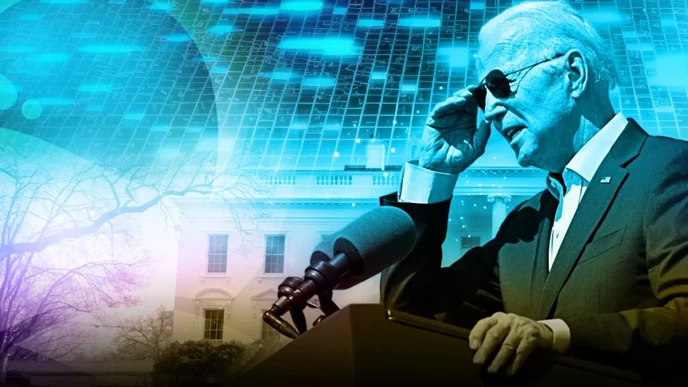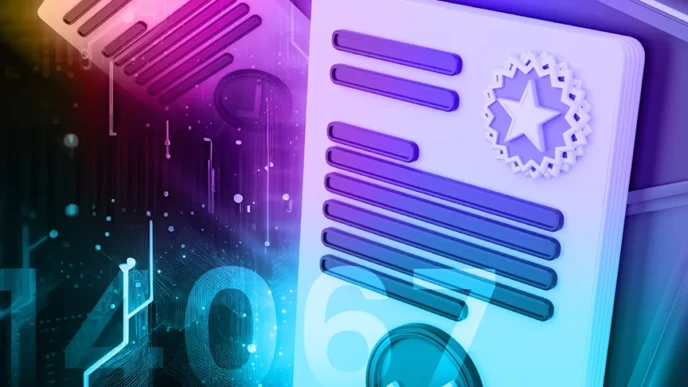
EXPLAINED: Executive Order 14067 - The Pros And Cons

The world is moving towards a cashless society, and the United States is not far behind.
The introduction of the Digital Dollar is closer than ever, and the Executive Order 14067 is what is propelling the United States towards this future.
President Joe Biden signed the Executive Order on Ensuring Responsible Development of Digital Assets on March 9, 2022. The order aims to encourage responsible development of digital assets, but there are pros and cons to consider.
While a digital dollar could offer faster and cheaper transactions with fewer intermediaries, it could also come with the potential for the government to track every single financial transaction.
As the U.S. economy pivots to a CBDC, it's time to understand the implications of the digital dollar and the executive order that is paving the way.
What Is Executive Order 14067?

Central banks around the world are trying to outdo one another on central bank digital currencies (CBDCs). China has the e-CNY. The Bahamas has the Sand Dollar. Not to be outdone and in a display of economic competitiveness, the United States is setting the stage for the Digital Dollar.
On March 9, 2022, President Joe Biden signed into law executive order 14067, aka the Executive Order on Ensuring Responsible Development of Digital Assets. By nature, an executive order means that the president didn’t need the approval of Congress or any U.S. state. And as the name suggests, order 14067 was designed with the overarching goal that digital assets would be built in a responsible manner.
You could say this objective is a bit deceiving. It suggests that the government knows more about responsibility when it comes to financial services and investor protection than some tech innovators. As you may have guessed, there’s more to it than meets the eye, so let’s explore the pros and cons of Executive Order 14067.
Executive Order 14067 Pros
If there’s one thing that blockchain pioneers have made clear, it’s that they are not opposed to regulation. They just want to see it done in a responsible way that will nurture innovation, not stifle it. At the very least, CBDCs are central bankers’ way to regain some control over this digital revolution that has disrupted financial services around the world.
For all of its faults, and there are many, order 14067 has a few potential benefits:

- Stimulus: The U.S. government could take a page out of China’s book and provide some incentive for Americans to use the CBDC early on. Policymakers could offer this in an attempt to bolster mainstream adoption of a digital dollar. For low income households, any amount of stimulus would probably help.
- A digital dollar would be considered synonymous with the banknote in many ways, at least to start. It would be valued the same and just take a digital form of the currency. So the U.S. government is not drumming up an entirely new currency from the ground up.
- In theory, order 14067 is interested in protecting U.S. consumers, investors and businesses. It seemingly seeks to strike a balance between the best side of crypto and the risks of digital assets. That’s what they say, anyway, but you can decide for yourself.
- Digital asset payments are inherently faster and cheaper than other payment methods, like credit cards, and this would seemingly carry over to a CBDC. With fewer financial intermediaries, like Visa and Mastercard, there aren’t as many fees involved in transactions. A digital dollar would just need to go through the Fed account.
Executive Order 14067 Cons
One of the things that order 14067 does is speeds up the U.S. economy’s pivot to a CBDC, whether government officials admit it or not. And that’s part of the problem, as they don’t seem to be owning up to their intentions along the way. Unfortunately, there are a host of negatives associated with order 14067.
Perhaps the scariest feature of a potential U.S. CBDC is that it will be totally trackable. A U.S. CBDC would have to be built on some ledger, akin to a bank account, that would be overseen by some government agency, like the Fed. And that’s how they’d go about tracking all transactions.
You might think that your transactions are already trackable with a debit card or a smartphone. A CBDC could only make things worse. And who’s to say that the U.S. government won’t take a page out of China’s book and decide to limit what you buy and the quantity of it? They could limit the purchases people make based on the income that they know you earn.
The U.S. government has already flagged transactions worth more than $600 on platforms like Venmo and PayPal. With order 14067, consumers and investors could see some of the same types of tracking and taxing taking place.
CBDC tracking means that the Fed will know where your digital dollars are going, including any political donations. If they don’t agree with a party or individual you choose to support, you could learn that they have chosen to freeze your Fed account. This is speculation at this point, but you catch our drift.
Investment banker Catherine Austin Fitts warns that the Fed is “trying to put into place a digital transactional control grid….If they don’t want you to be able to use your money five miles from your home, that’s it your money will turn off five miles from your home.” Fitts believes it will wind up being the Bank of International Settlements (BIS) that will control the show.
Or, as YouTube account “I Allegedly” suggests, they could take it a step further and assign you a social credit score that is determined by the things you buy. On that note, they could also decide that the businesses that you use to buy things from don’t have a reputable social credit score and therefore you must stop giving them your business.
Needless to say, with the arrival of a CBDC, the U.S. government could decide to do away with cash so that they can track more of the transactions that Americans make. There’s not a great deal of transparency around a U.S. CBDC and what it would actually look like. Some of the most ominous of predictions have suggested it could take the form of a microchip implant.
Basically the government is expanding its control over the financial lives of American citizens.
Be Ready
Now that the cat is out of the bag on CBDCs, it’s up to everyone to take control of their own finances. Whether 2023 turns out to be the year of the CBDC remains to be seen. After the crypto meltdowns that rocked the industry in 2022, the Fed could use those scandals as a catalyst to implement a CBDC sooner than later, especially with order 14067 in the mix.
For those who are paying attention, decentralized finance (DeFi) provides an alternative to global financial systems that could help someone to stay in control of their own money as much as possible for as long as possible.
Watch Our Latest Videos.
Subscribe!Disclaimer:Please note that nothing on this website constitutes financial advice. Whilst every effort has been made to ensure that the information provided on this website is accurate, individuals must not rely on this information to make a financial or investment decision. Before making any decision, we strongly recommend you consult a qualified professional who should take into account your specific investment objectives, financial situation and individual needs.

 What's New?
What's New?
